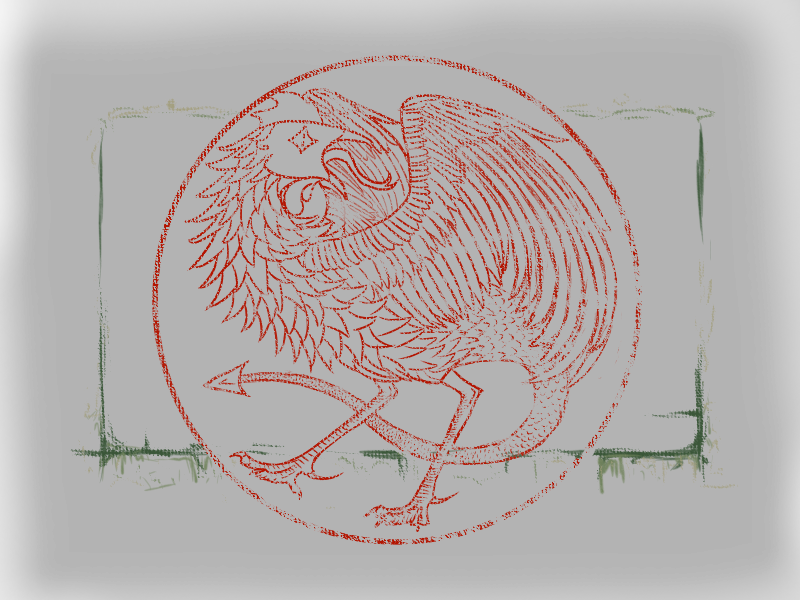The long building on the right was much like the first. It held two long hallways lined with doorways that led into empty bedrooms that seemed awkwardly stuffed into the structure. Here and there were little graffitis, bits of paper and cloth, and other little scraps from those who had once slept in those beds, sat at those desks, and opened those shattered windows to let the breeze in. Unlike the other living hall, though, this one is intact.
gap
Its northern wall stands tall and solid somehow, with double doors to the east and west leading out into the world. A strip of unpaved ground along the northern wall holds ivy and morning glory climbing up the wall and spilling out over the cobblestones. A pair of clean-cut ivy stumps stick out of the snarl, white and cracked from age. A rickety, decaying ladder leans up against one of the longer walls, leading up to the roof. Not daring to trust the ladder, I climbed a few stones of the outer wall and could see up to the weathered shingles of the roof. There was a scattered pile of shingles beside a bare corner of roof. Back down on the ground, I looked closely and could see shingles that had never had nails driven through them, next to what remained of a hammer and a box that held unused nails, their straight shafts marred by orange rust.
gap
I stepped through the doors and into darkness until my eyes could adjust. The roof was largely intact, letting only narrow shafts of light through. The wooden floors sat faithfully flat and stable, rippling a little near a stream of lichen where water had made a habit of trickling down through a leak in the roof. I stood in some kind of common area.
gap
The room was large. There was a great fireplace at the end, with upholstered chairs and a pair of couches arranged around it. A few bits of charcoal and pieces of bat guano sat in the cold stone frame. A bar above the fireplace was hung with a couple pairs of socks, a cobweb feebly draped between the cloth and the wall behind. A book sat on the couch. Though old, I could dust off its cover, open it up, and read it. It was a collection of old tales and stories I’d grown up reading as a child. One dog-ear marked the beginning of a favorite story of mine,
“The Farmer and the Sheepdog”.
gap
A few tables were neatly arranged around the room, some chairs pushed in respectfully and others pushed out as though their users had just gotten up to go get something real quick. There were a few dishes in a pile on the largest table. Just dirt and a bit of crust sat where little scraps of uneaten food had once decayed, molded, and dried up, not even insects or fungus finding anything left to eat. A little round table held the dusty remains of a game of chess. A row of white pieces stood on the left, a shorter row of black pieces stood on the right. One white piece had fallen onto the floor. I picked it up and felt the divots in the old bone where mice had gnawed the knight’s once-steadfast face into a chipped, amorphous figure. I set it back in a row on the table beside its other fallen companions.
gap
Amidst a sea of open or unlocked doors, a single one stood out. It was at the beginning of the hall, right next to the common area. A bit of shrub was pinned to the doorframe, some kind of cypress; ‘something’ vitae, I think. What really drew my attention was a note pinned to the door. The paper was hardly yellowed, its edges crisp. It read,
gap
“Got to travel a couple towns over for work. I’ll be back in a few days to help you finish fixing that roof. I’ll bring you back a good pair of gloves if you fix that dent in my helmet for me in the meantime. Thanks! -Jess”
gap
The air seemed to grow a little heavier in my lungs. Slowly, I reached towards the door handle and felt the hum-buzz of magic, weak with age, but holding a spell I couldn’t identify off the top of my head. I drew my hand towards the note and felt the hum there, too, just a simple charm to preserve the paper against light and moisture, like you would for a letter you were sending across the country, or a drawing you were particularly proud of and wanted to hang up on your wall. There was another trace of magic—not a hum, but a whisper—surrounding the plant on the doorframe: the remains of a familiar spell I use to keep foraged vegetables from wilting.
gap
I looked at the doorknob again. Whether it was once meant to be dangerous or not, the spell on the door couldn’t hurt me if it tried, too old and faded to matter anymore. Still, I stood there for long moments before turning away and leaving it alone.
gap
Before leaving, I turned to the fireplace again. This time, I looked up and saw something I hadn't noticed before, some kind of symbol or emblem on the stone bricks up above.
Gap
Gap
Meet you in the Ruins.
gap

